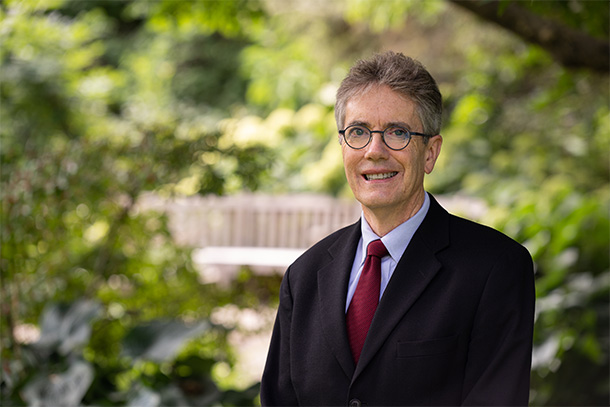
Robert Melton, professor of aerospace engineering at Penn State, will be honored as a newly elected full member of the International Academy of Astronautics on Sept. 17 in Paris. Credit: Kelby Hochreither/Penn State. All Rights Reserved.
Aerospace engineer Robert Melton elected to international society
September 16, 2022
By Ashley WennersHerron
UNIVERSITY PARK, Pa. — Robert Melton, professor of aerospace engineering at Penn State, was elected a full member of the International Academy of Astronautics (IAA), an organization focused on global scientific cooperation across disciplines to advance human space exploration. Melton will be honored in Paris on Sept. 17 during the International Astronautical Congress, an annual event co-hosted by the IAA and the International Astronautical Federation, a space advocacy group.
Founded in Stockholm in 1960, IAA is a non-governmental organization with members from 83 countries. The organization strives to bring together the “world’s foremost eminent experts in astronautics for the good of humanity,” according to the IAA website. The IAA supports and facilitates international cooperation in space and was officially recognized by the United Nations in 1996.
“To be elected a member of the IAA is an incredible honor, and we are so proud of Dr. Melton and his work,” said Amy Pritchett, department head of aerospace engineering at Penn State. “The election process consists of the top researchers in astronautics recognizing the strength of nominee’s work, as well as assessing the commitment the nominee has to their fellow humans and dedication to advancing cooperative space exploration. Dr. Melton is exemplary in both categories.”
Melton researches the astrodynamics of orbital mechanics and designs for space mission trajectories, as well as how to improve methods for controlling a spacecraft’s orientation.
“My work is analytical, based in computations and mathematics, and we are always looking for ways to yield more accurate solutions quicker,” Melton said. “Computers are getting faster, but some problems — such as how to efficiently move a spacecraft using low-level thrust in a complex gravity field — still require large amounts of time on computer clusters to get an initial solution. How do we solve those problems on a satellite, which needs the answer to continue operating effectively, with minimal computational ability on board? That’s what we’re working to develop and to continue to improve.”
Melton will join fellow IAA members and several thousand others from industry, government and academia at the joint congress this fall. The planned seminars and panels will address a broad array of topics related to humans and space, including engineering, physical sciences, biological sciences, space law, space policy, cultural and societal impacts on and from space exploration and more.
“I’m honored to be elected as a member of IAA, and I am looking forward to learning more about and contributing to the broad array of interests that the academy addresses,” Melton said.
IAA also publishes a peer-reviewed journal, Acta Astronautica, for which Melton has served as a co-editor since 2017. In addition to his service to IAA, Melton is an associate fellow of the American Institute of Aeronautics and Astronautics and a fellow of the American Astronautical Society (AAS). He is also a member of Sigma Xi, Sigma Pi Sigma and Omicron Delta Kappa. Melton has also earned several awards, including the Dirk Brouwer Award from AAS, the AIAA Faculty Adviser Award and the AIAA Sustained Service Award.



